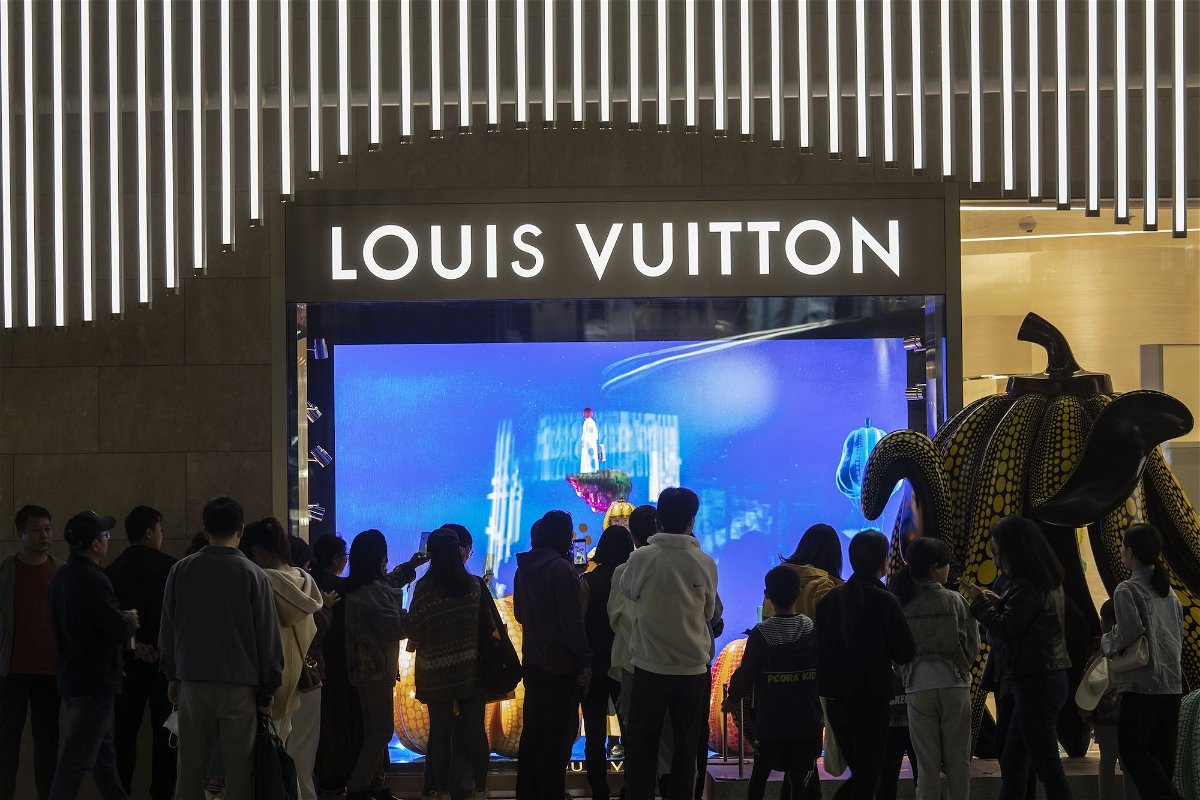LVMH owner Bernard Arnault visits China after luxury spending rebound

An LVMH Moet Hennessy Louis Vuitton store in Shanghai
By Laura He, CNN
Hong Kong (CNN) — Bernard Arnault, chairman and CEO of LVMH (LVMHF), has arrived in China for his first visit to the country since the end of its strict Covid restrictions, after his company posted a jump in sales driven by a rapid rebound in Chinese spending on luxury goods.
The French billionaire is the latest in a string of prominent business leaders to have visited China, following trips by Tesla (TSLA) CEO Elon Musk and JP Morgan (JPM) CEO Jamie Dimon last month. Beijing has been wooing global CEOs in an effort to arrest a slump in business confidence and to divide Western businesses from governments on their policy toward China.
Arnault, who has recently been surpassed by Musk as the richest person in the world, was spotted at several shopping malls in downtown Beijing on Tuesday, according to state media reports, citing photos on Chinese social media.
Privately-owned business magazine Caijing said the French entrepreneur inspected several brand stores owned by LVMH, including Christian Dior and Bulgari, in the WF Central and SKP malls, citing photos taken by local residents.
LVMH didn’t immediately respond to a CNN request for comment.
LVMH reported its first-quarter sales surged 17% from a year ago, beating analyst expectations, driven by a rebound in China’s luxury market from the decline it experienced during the pandemic.
The company had registered “some pretty nice pick up in China, which bodes well for the rest of the year,” its chief financial officer Jean-Jacques Guiony told analysts during a quarterly sales call in April.
Consumers were returning to the company’s stores, and online sales were picking up, he said.
“We definitely see a normalization of this market… We are extremely hopeful and should benefit from a strong push from mainland China in 2023.”
Beijing called an end to its stringent and often oppresive zero-Covid policy in December, which resulted in an initial burst in consumer activity following three years of rolling lockdowns. Luxury goods spending bounced back more quickly than any other sector in the first quarter.
Although the economic momentum has lost steam in the past couple of months, growth in luxury goods sales has accelerated.
According to government statistics released this month, retail sales of jewelry, gold and silver surged 19.5% in the first five months of 2023 from a year ago, the biggest jump among all categories for goods.
China was one of the world’s largest luxury goods markets before Covid hit. Bain & Co. estimated earlier this year that Chinese consumer spending accounted for around 17% of the global luxury market in 2022. That represented a decrease from 35% in 2019.
But the momentum is set to resume this year, as local consumer appetite remains strong and China recovers from the impact of Covid, the consulting firm said in a report in February.
“Compared to other emerging markets, China is a behemoth for luxury growth,” it said, adding that the country has a larger number of middle- and high-income consumers.
Charm offensive
Arnault’s visit also comes as Beijing woos global CEOs to appease fears about its unfriendly policies to foreign capital. Business confidence has slumped after Chinese authorities raided several foreign consultancies, leaving Western companies uneasy about their future in the country.
The deteriorating sentiment has exacerbated the country’s economic woes, resulting in a sharp drop in private-sector investment and a rise in unemployment.
Late last month, Musk visited China for the first time in three years and met a string of senior officials, who encouraged him to boost investment and operations in the country.
Top Chinese leaders are also trying to split businesses from governments on their China policy, in order to push back against efforts by Western nations to “de-risk” from the Chinese economy.
On Tuesday, Chinese Premier Li Qiang said at a World Economic Forum event that “de-risking” decisions should be made by companies rather than governments.
“Some people in the West are hyping up so-called concepts of reducing dependency [on China] and de-risking [from China]. I would say these concepts are false propositions,” Li said.
“It is businesses that are the most sensitive [to such risks] and are hence in the best position to assess such risks. They should be left to come to their own conclusion and make their own choice,” he said.
“Governments and relevant organizations should not overreach themselves.”
— CNN’s Wayne Chang and Beijing bureau contributed reporting.
The-CNN-Wire
™ & © 2023 Cable News Network, Inc., a Warner Bros. Discovery Company. All rights reserved.